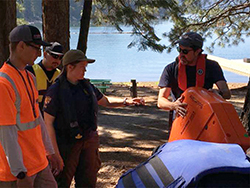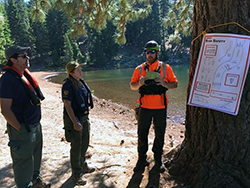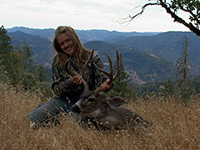


Hailey Marie Harrell is an Office of Spill Prevention and Response (OSPR) environmental scientist working as part of the Northern Field Response Team. She graduated from the University of California, Davis, in 2013, with a double major in Plant Biology and English.
Hailey was initially hired as a scientific aid for CDFW’s Habitat Conservation Planning Branch’s Native Plant Program. There, she had the opportunity to do field work with skilled botanists on some of California’s most sensitive plants, conduct census surveys and issue California Endangered Species Act scientific collection permits. She promoted to a permanent role with OSPR in 2016, and has been immersed in the world of oil spill prevention and response ever since.
A relative newcomer to CDFW in terms of job tenure, Hailey has a very fresh perspective on working as an OSPR environmental scientist.
Who or what inspired your love of natural resources?
I’ve spent countless hours in the woods and along waters of this state and I have observed many wonderful and fascinating things within them. I was raised by avid hunters and fishermen who instilled in me an admiration of our truly beautiful natural resources. They hammered home the importance of conservation and taught me to take care to leave places as good as, if not better, than I found them.
How did you come to work for CDFW?
I chose to study plants instead of animals when I got to college because they were a form of life I knew very little about. I was encouraged by a few professors who liked my writing style to take English courses while in college because it is rare to find someone who loves science and also enjoys writing. They saw me as a bridge between technical information and the layperson.
After college, I took a job as a technical writer for a privately contracted aerospace and defense company. After several months, I had learned all the ins and outs of the position and no longer felt challenged. I spent every minute of every 40-hour workweek sitting at a desk in front of a computer screen. In the small bits of time I could manage, I took every opportunity to network with people that were already working in various natural resource agencies. Through these interactions, I got to know some great employees of CDFW who gave me advice and let me do some volunteer work to gain experience for my resume. I eventually landed a scientific aid position with CDFW’s Native Plant Program where I learned my way around the intricacies of state service as I assisted in surveying some of California’s amazing threatened and endangered plant species and issued permits for their protection.
Why did you change your focus from native plants to oil spill response?
I didn’t know if I could love a job as much as the one I had with the Native Plant Program, but knew I couldn’t stay a scientific aid forever so I applied for environmental scientist positions. The OSPR position I have now was the only one of many applications I submitted that gave me a call back. I went into my interview knowing nothing about OSPR except what I had scrambled to learn about it before the interview. I was ecstatic, but at the time had no idea how truly lucky I would be to be offered this position.
Was there a tough learning curve?
The learning curve when joining OSPR was very steep, initially. I think the most challenging aspect was figuring out all the acronyms that are used. In working with the Native Plant Program I scrambled to learn the intricacies of working for a government agency, but the language itself was straightforward because I was exposed to plant terminology throughout college. OSPR was a whole different ball game. For example, it took some time just for me to realize that they were saying “T and E” species (referring to threatened and endangered wildlife) instead of “teeny” species. I would hear the question, “Were any teeny species impacted by the spill?” and would quietly wonder why they were only concerned with little organisms.
In your new position at OSPR, what are your typical duties?
As a first responder to petroleum spills, I work with a wide variety of our state’s natural resources and travel to many beautiful places across California. I get to work closely with our game wardens, the U.S. Coast Guard, private industry and other local, state and federal government agencies. At some spills, I will be the first person on scene and will have to convey my initial findings to my team to determine what level of response we will need to resolve the issue. Sometimes I will be on my own to resolve the issue, sometimes there will be a small group of us working together and sometimes there will be a large contingency of federal, state and local agencies involved to help resolve the incident. Each incident has a unique set of obstacles that need to be overcome. I fill whatever role is necessary to help get the job done as quickly as possible.
This job is also full of surprises. Few days are the same as a first responder to petroleum spills. One minute you think you’ll be in the office all day and the next minute you’re in the car driving to the coast to walk the shorelines and look for oil, or responding to a sunken vessel, or getting to the scene of a truck crash, etc. Weird reports sometimes come in that challenge your knowledge and your strategies for managing problems. It is hard to get bored, and that is one of the many things I love about it.
What has been the most exciting or enjoyable aspect of working at OSPR for you so far?
I think that the most exciting part of the job has to be emergency response. When you go on call you never really know what kind of spills you are going to get. When you get a report of a spill that warrants a response you generally know where you need to go, but there’s almost always some ambiguity regarding what you are going to find. I love working in a position where there’s so much variety.
The networking, training and interagency collaboration are equally enjoyable aspects of the job. For example, one of my first oil spill drills played out a scenario at an oil refinery in San Pablo Bay. It was a large drill with key representatives from the refinery, government agencies, county hazmat, etc. No more than a month later, there was a response to that very same refinery and almost all of those key players I met at the drill were in the command post during a real event. It felt like déjà vu being there and seeing everyone again. It helped put into perspective just how important it is to practice with drills and meet the key players that will be involved during real spills. It builds trust and understanding between those parties involved and helps to demonstrate that we are all working towards a common goal.
You’re still early in your career. Where do you think you will be, professionally speaking, in five years, or 20 years?
I can really see myself sticking with OSPR for the long hall through to retirement. From discussions with friends and family, this really is a unique and amazing position I am in that is unlike any they have heard of before. I need variety to keep myself content and OSPR certainly has that.
Any advice for people considering careers in science or natural resources?
Having a job where I could contribute to prolonging our natural resources and get out in the outdoors to enjoy them as much as possible has been a dream I did not know I would achieve, but that was my goal and I fought for it. You may have to scrape by and do things that you don’t want to for a while (maybe even a long while), but if you have enthusiasm, determination and a true love of conserving our natural resources, keep working towards your goals. Talk to people, volunteer your time and keep climbing the ladder. Eventually, if you remain persistent, you will find yourself somewhere you never thought you’d be, with a job that you can’t imagine being without.